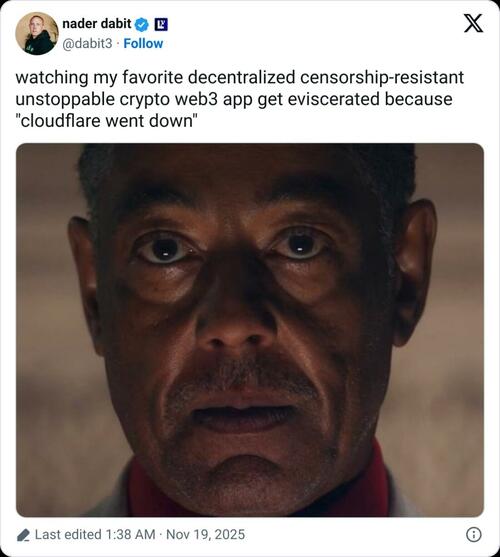Cloudflare Blames Database Error For Outage That Took Down 20% Of The Web
Authored by Brayden Lindrea via CoinTelegraph.com,
Internet services provider Cloudflare says that a fault in its bot detection system triggered an outage that took down around 20% of webpages, including several crypto platforms.
Cloudflare said in a post-mortem statement on Tuesday that a “feature file” used by its Bot Management System to fight off cyberattacks grew beyond its normal limit, leading to a failure in Cloudflare’s software.
“We are sorry for the impact to our customers and to the Internet in general. Given Cloudflare’s importance in the Internet ecosystem any outage of any of our systems is unacceptable.”
The company initially suspected the incident was caused by a hyper-scale Distributed Denial of Service attack, but confirmed there was no cyberattack or malicious activity.
Cloudflare handles roughly 20% of internet traffic and powers around one-third of the top 10,000 websites, apps and services.
Its outage took out the websites for Coinbase, Blockchain.com, Ledger, BitMEX, Toncoin, Arbiscan, and DefiLlama, as well as X and ChatGPT, leading some crypto commentators to remark on the crypto industry’s reliance on centralized systems, some of which also went offline when Amazon Web Services suffered a network outage last month.
Source: Nader Dabit
A spokesperson for EthStorage, which offers a product allowing Ethereum to be used as a web server, told Cointelegraph that the AWS and Cloudflare outages show “centralized infrastructure will always create single points of failure.”
“A complete decentralized web stack is needed more than ever,” the company said.
Vitalik Buterin wants decentralization prioritized
Last Wednesday, Ethereum co-founder Vitalik Buterin authored a “Trustless Manifesto,” which called on industry builders to never sacrifice decentralization in pursuit of adoption.
Buterin and Ethereum Foundation researchers Yoav Weiss and Marissa Posner, said crypto platforms sacrifice trustlessness from the moment that they integrate a hosted node or centralized relayer, explaining that while it feels harmless, each new checkpoint becomes a potential chokepoint.
Tyler Durden
Wed, 11/19/2025 – 10:45ZeroHedge NewsRead More






 R1
R1
 T1
T1


